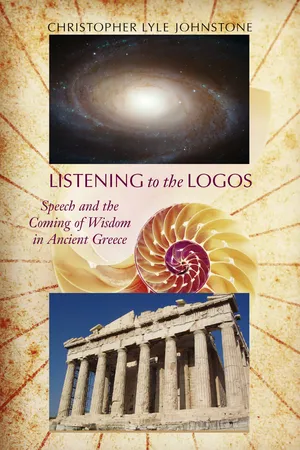
Listening to the Logos
Speech and the Coming of Wisdom in Ancient Greece
- 312 pages
- English
- ePUB (mobile friendly)
- Available on iOS & Android
About this book
An exploration of the role of language arts in forming and expressing wisdom from Homer to Aristotle
In Listening to the Logos, Christopher Lyle Johnstone provides an unprecedented comprehensive account of the relationship between speech and wisdom across almost four centuries of evolving ancient Greek thought and teachings—from the mythopoetic tradition of Homer and Hesiod to Aristotle's treatises.
Johnstone grounds his study in the cultural, conceptual, and linguistic milieu of archaic and classical Greece, which nurtured new ways of thinking about and investigating the world. He focuses on accounts of logos and wisdom in the surviving writings and teachings of Homer and Hesiod, the Presocratics, the Sophists and Socrates, Isocrates and Plato, and Aristotle. Specifically Johnstone highlights the importance of language arts in both speculative inquiry and practical judgment, a nexus that presages connections between philosophy and rhetoric that persist still. His study investigates concepts and concerns key to the speaker's art from the outset: wisdom, truth, knowledge, belief, prudence, justice, and reason. From these investigations certain points of coherence emerge about the nature of wisdom—that wisdom includes knowledge of eternal principles, both divine and natural; that it embraces practical, moral knowledge; that it centers on apprehending and applying a cosmic principle of proportion and balance; that it allows its possessor to forecast the future; and that the oral use of language figures centrally in obtaining and practicing it.
Johnstone's interdisciplinary account ably demonstrates that in the ancient world it was both the content and form of speech that most directly inspired, awakened, and deepened the insights comprehended under the notion of wisdom.
Tools to learn more effectively

Saving Books

Keyword Search

Annotating Text

Listen to it instead
Information
Table of contents
- Cover
- Half title
- Title
- Copyright
- Dedication
- Contents
- Series Editor’s Preface
- Acknowledgments
- Prologue
- One The Greek Stones Speak: Toward an Archaeology of Consciousness
- Two Singing the Muses’ Song: Myth, Wisdom, and Speech
- Three Physis, Kosmos, Logos: Presocratic Thought and the Emergence of Nature-Consciousness
- Four Sophistical Wisdom, Socratic Wisdom, and the Political Life
- Five Civic Wisdom, Divine Wisdom: Isocrates, Plato, and Two Visions for the Athenian Citizen
- Six Speculative Wisdom, Practical Wisdom: Aristotle and the Culmination of Hellenic Thought
- Epilogue
- Notes
- Bibliography
- Index
Frequently asked questions
- Essential is ideal for learners and professionals who enjoy exploring a wide range of subjects. Access the Essential Library with 800,000+ trusted titles and best-sellers across business, personal growth, and the humanities. Includes unlimited reading time and Standard Read Aloud voice.
- Complete: Perfect for advanced learners and researchers needing full, unrestricted access. Unlock 1.4M+ books across hundreds of subjects, including academic and specialized titles. The Complete Plan also includes advanced features like Premium Read Aloud and Research Assistant.
Please note we cannot support devices running on iOS 13 and Android 7 or earlier. Learn more about using the app